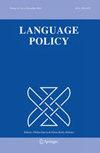来源期刊
期刊介绍:
Language Policy is highly relevant to scholars, students, specialists and policy-makers working in the fields of applied linguistics, language policy, sociolinguistics, and language teaching and learning. The journal aims to contribute to the field by publishing high-quality studies that build a sound theoretical understanding of the field of language policy and cover a range of cases, situations and regions worldwide.
A distinguishing feature of this journal is its focus on various dimensions of language educational policy. Language education policy includes decisions about which languages are to be used as a medium of instruction and/or taught in schools, as well as analysis of these policies within their social, ethnic, religious, political, cultural and economic contexts.
The journal aims to continue its tradition of bringing together solid scholarship on language policy and language education policy from around the world but also to expand its direction into new areas. The editors are very interested in papers that explore language policy not only at national levels but also at the institutional levels of schools, workplaces, families, health services, media and other entities. In particular, we welcome theoretical and empirical papers with sound qualitative or quantitative bases that critically explore how language policies are developed at local and regional levels, as well as on how they are enacted, contested and negotiated by the targets of that policy themselves. We seek papers on the above topics as they are researched and informed through interdisciplinary work within related fields such as education, anthropology, politics, linguistics, economics, law, history, ecology, and geography. We particularly are interested in papers from lesser-covered parts of the world of Africa and Asia.
Specifically we encourage papers in the following areas:
Detailed accounts of promoting and managing language (education) policy (who, what, why, and how) in local, institutional, national and global contexts.
Research papers on the development, implementation and effects of language policies, including implications for minority and majority languages, endangered languages, lingua francas and linguistic human rights;
Accounts of language policy development and implementation by governments and governmental agencies, non-governmental organizations and business enterprises, with a critical perspective (not only descriptive).
Accounts of attempts made by ethnic, religious and minority groups to establish, resist, or modify language policies (language policies ''from below'');
Theoretically and empirically informed papers addressing the enactment of language policy in public spaces, cyberspace and the broader language ecology (e.g., linguistic landscapes, sociocultural and ethnographic perspectives on language policy);
Review pieces of theory or research that contribute broadly to our understanding of language policy, including of how individual interests and practices interact with policy.
We also welcome proposals for special guest-edited thematic issues on any of the topics above, and short commentaries on topical issues in language policy or reactions to papers published in the journal.
期刊最新文献
Bilingual education rejected: English-only despite Lau
Community-based and formal Chinese language education in urban California, 50 years after Lau v. Nichols
Principal agency 50 years after the Lau decision: Building and sustaining bilingual education programs for Asian languages
Reflections on Lau: A historical perspective
English-medium teachers as policymakers through critical translingual literacy instruction


